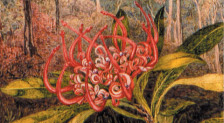 |
 |
|
Philosophy and Philosophers From 1902 to 1913 RL Dunbabin, a Tasmanian with an Oxford degree, lectured on Mental and Moral Sciences in the Department of Classics and English Literature, University of Tasmania. In 1913 Melbourne-trained E Morris Miller was appointed to a lectureship in Philosophy and Economics. Miller became professor of the Department of Philosophy and Psychology in 1928, and continued teaching until 1951. Although he published a number of works on Kantian ethics, he was as much an applied psychologist as a philosopher. His great contribution to Australia letters was the seminal two-volume bibliography, Australian literature from its beginnings to 1935 (1940). When Sydney Sparkes Orr was appointed to the Chair of Philosophy in 1952, philosophy became an independent discipline. Orr began to modernise the curriculum and played an active part in university affairs, but his dismissal in 1956 precipitated the notorious Orr case. The Philosophy Department achieved unwanted fame, with black bans on filling of the Chair of Philosophy. Philosophy was kept alive through the efforts of lecturer Dr K Milanov, visiting professors and members of other departments. Among them was CD Hardie, Professor of Education (1945–77), an associate of Ludwig Wittgenstein at Cambridge, and author of an essay on modern thought (1947) which evoked the praise of Albert Einstein. In 1969, after the lifting of the black bans, Dr WD Joske rebuilt the Department so that it offered a full range of undergraduate subjects and Masters' and Doctors' degrees. A bequest allowed the annual James Martineau Memorial Lectures on moral philosophy and the philosophy of religion. Launceston students could study externally, then at the Tasmanian College of Advanced Education. When this merged with the University, philosophers on both campuses belonged to a single school. In the 1990s Professor Jay Garfield established a link with the Central Institute of Higher Tibetan Studies. Courses in Buddhist philosophy were introduced and students were exchanged between the two institutions. There always had been some interest in philosophy outside the University. Samuel Lovell, an educationist, was one example early in the twentieth century, the poet Gwen Harwood in later years. JE Mercer, Anglican Bishop 1902–14, introduced Bergsonian elements into his theology, and Eric D'Arcy, Catholic Archbishop 1988–99, has written on the rights of conscience. Further reading: S Grave, A history of philosophy in Australia, St Lucia, 1984; R Davis, Open to talent, Hobart, 1990. WD Joske |
Copyright 2006, Centre for Tasmanian Historical Studies |